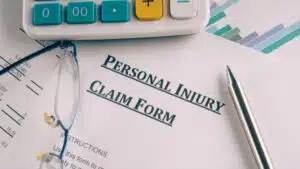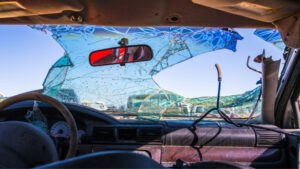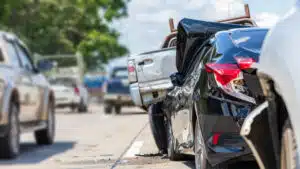
This week’s question comes from T.J. in the Outer Sunset who asks: “I was recently hit by a car while I was parked in my car listening to music. My car was wrecked and my shoulder got hurt. I called my insurance company and they said that my policy had lapsed. I had moved a while back and my old roommate didn’t tell me that the bill had come in. I would have paid it had I known. I called a lawyer and he said that even though it wasn’t my fault I could get my car fixed, my hospital bills paid, my time off work paid but nothing for the pain that it cost. How can this happen? I didn’t do anything wrong.”
In 1996 the voters passed the “Personal Responsibility Act,” commonly known as Proposition 213 and codified in the California Civil Code at Sections 3333.3 & 3333.4.
Proposition 213 restricts the right of uninsured motorists to recover damages for pain and suffering in in three situations. Non-economic damages, which include compensation for your pain and suffering, are barred:
1) if the driver themselves is convicted of DUI;
2) where the injured was not carrying the state minimum liability insurance at the time of the accident; and
3) when someone suffers injury while committing a crime or fleeing from a crime which they are later convicted of as a felony.
Since its passage, Proposition 213 has been bizarrely applied in a host of cases.
In 2000, in the case of Harris v Lammers, a woman standing behind her parked car, handing balloons to her children through the window, was injured by a motorist pulling out of a parking space who clipped the door and pinned the victim against her vehicle causing her serious injury. Mrs. Harris did not have insurance on her vehicle at the time.
The Appellate Court ruled that Mrs. Harris clearly was “using” the Izusu to transport her children and supplies. The Court went on to say that, “just as clearly, the accident arose out of and flowed from that use. Indeed, it appears that Harris was in the parking lot where the accident occurred precisely because she was using the Izusu to transport her children and supplies. We conclude this was an action “arising out of … [the] use of a motor vehicle” and that Civil Code section 3333.4 applied.”
The Court said: “Although driving is included within the concepts of operation and use of a vehicle, operation is a broader concept than driving and does not require that the vehicle be in motion or even have the engine running. Operation includes stopping, parking on the highway, and other acts fairly regarded as a necessary incident to the driving of the vehicle….”
In 1998, in a case called Cabral v. Los Angeles City Metropolitan Transportation Authority, an uninsured driver brought a negligence action against a county transportation authority after defendant’s bus collided with the door of plaintiff’s legally parked car as plaintiff was exiting the car. The Plaintiff was denied the right to his full measure of damages per application of Proposition 213.
The Appellate Court reasoned that being in a parked car was a form of use stating: “Limiting plaintiff’s damages in this case to economic losses tends to equalize the litigation benefits for insured plaintiffs suing uninsured defendants and uninsured plaintiffs suing insured defendants.”
The Cabral case is very similar to yours. Unless the driver is convicted of either drunken driving or committing a felony, Civil Code Section 3333.4 will, I think unfairly, preclude you from recovering for your pain and suffering unless the driver who hit you was drunk, committing a felony or fleeing from one and they are convicted of the crime.
One of the hardest things I have to do when meeting with potential clients is explain that insurance companies sponsored Proposition 213 to save themselves millions of dollars.
Although they can unfairly deny you compensation for your pain and suffering, they owe you every penny for your economic damages such as your property damage, medical bills and lost wages.
Related Content: What is California Proposition 2013?
This article was written by Chris Dolan and published by The San FranciscoExaminer. To read all of Chris’ articles on the law published by the Examiner click here.










